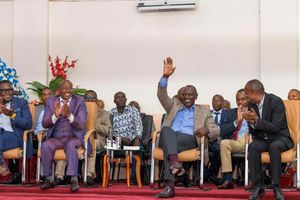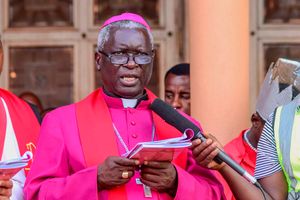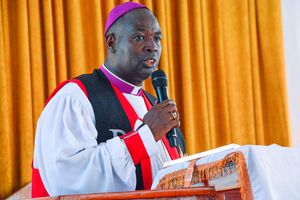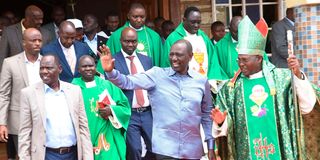
President William Ruto attends mass at Our Lady of Fatima Catholic Church in Moiben, Uasin Gishu County, on October 27, 2024.
When President William Ruto took office 1,000 days ago, he had a solid alliance with Kenya’s church leaders. But not long after, the union started fraying.
Once his most ardent supporters—prayerful allies on the campaign trail and vocal defenders from the pulpit—sections of the clergy and believers are now stepping back, voicing disillusionment and questioning his leadership.
Amid economic hardship, political turmoil and public unrest, the church’s shift signals a broader loss of faith—not just spiritually, but politically—in a President they once called “God-chosen.”

President William Ruto at a past church function in Nairobi.
The church-State relationship appeared harmonious until the discovery of mass graves in Shakahola in early 2023 linked to a cult led by Paul Mackenzie.
The incident exposed the lack of regulatory oversight of religious organisations and raised questions about the State’s complicity or negligence.
In response, President Ruto established a task force and part of its job was to push for control of the proliferation of extremist and predatory religious organisations.
This sparked a backlash from Pentecostal leaders who argued Ruto’s government was infringing on religious freedoms. Church leaders opposed the Religious Organisations Bill, which was later withdrawn, with calls of “respect the church, you can’t probe us yet we brought you into power”.
In June 2024, the State’s heavy-handed response to the anti-tax protests led by the youth exposed an even bigger crack in the once-solid relationship between the church and the Ruto administration.
Initially, many church leaders remained silent or offered tepid responses, leading to accusations of complicity. Eventually, religious institutions began to speak out.
The National Council of Churches of Kenya criticised the government’s actions. The Catholic Church and the Anglican Church of Kenya also issued statements condemning the violence and urging the State to respect citizens’ rights.
Some churches took proactive steps to support protesters. And in the aftermath, some barred politicians from speaking at their pulpits, acknowledging the youth’s call for depoliticised worship spaces.
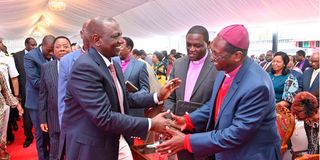
President William Ruto and religious leaders during a thanksgiving church service at the State House, Nairobi, on September 25, 2022
In a significant departure from tradition, several churches began rejecting donations from political figures, including Dr Ruto. The Catholic Archdiocese of Nairobi and the Anglican Church of Kenya for example, declined contributions in millions.
In several sermons, the clergy has expressed regret and disillusionment.
“I have always been thinking that this government is a government of God; it is a government of fights,” Teresia Wairimu of Faith Evangelistic Ministry once said.
Tony Kiamah, a reverend of the River of God Church delivered a sermon likening the government’s actions to those of a thief. He highlighted issues such as the rising cost of living, corruption and the suppression of dissent as evidence of the State’s moral decay.
However, not all churches have distanced themselves from the Ruto government. In March at Jesus Winner Ministry in Roysambu, Dr Ruto pledged Sh20 million towards the church’s construction project estimated at Sh1 billion. The President also committed to mobilising friends to raise an additional Sh100 million.
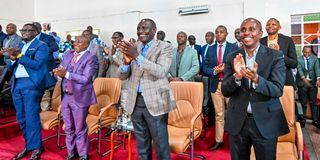
President William Ruto, Dagoretti South MP John Kiarie (right), General Overseer Jesus Winner Ministry, Edward Mwai (second left) and Nairobi Governor Johnson Sakaja during a church service at Jesus Winner Ministry in Roysambu, Nairobi County, on March 2, 2025.
Edward Mwai, a bishop and the church’s overseer, welcomed the pledge, emphasising Dr Ruto’s longstanding association with the church since 2009.
While the donation sparked public debate, the church clarified that the funds were pledged, not yet received and would support their expansion plans to accommodate a growing congregation.
Historically, the Kenyan church has been a formidable force in advocating for social justice and political reform. Figures like Bishop Henry Okullu, Bishop Alexander Muge and Archbishop Ndingi Mwana Nzeki were instrumental in championing human rights.
Political analysts say re-establishing trust with the church will require Dr Ruto to undertake significant reforms. Edwin Kegoli, a political and policy analyst thinks it is over between Dr Ruto and the church.
“... when he took over power, the people in churches were very expectant of him to turn around the economic fortunes... Instead, the situation has been compounding... making life a lot harder,” he said.
He went on: “We have seen churches criticise, discredit and embarrass him in terms of donations, and this is not going down well. So, I think he’s lost quite a significant chunk of the voting bloc in church and when religious leaders start to speak against something, then it will have its strength felt somewhere.”
See some of our other Ruto@1,000 coverage below:


